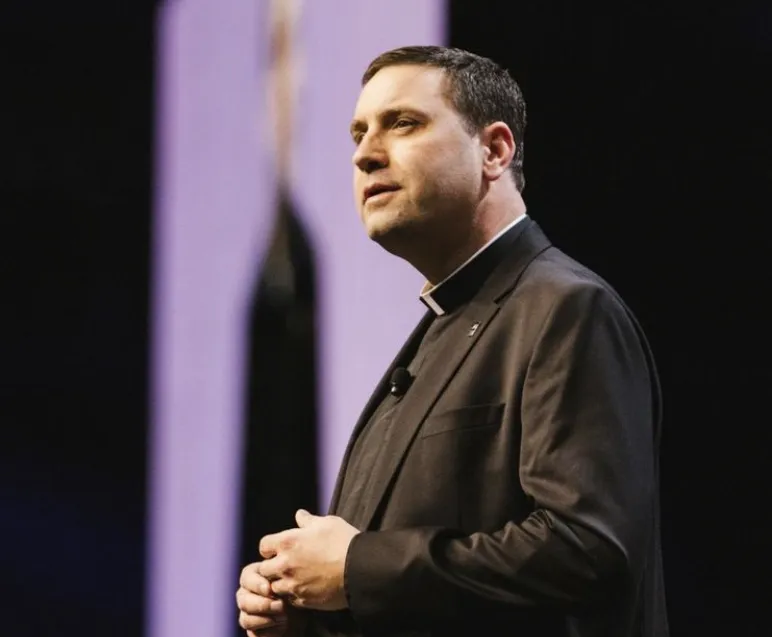
Rome Newsroom, Jan 15, 2024 / 09:37 am (CNA).
Pope Francis responded publicly to questions about the Vatican’s declaration on blessings for same-sex couples for the first time in a television interview on Sunday night.
In an appearance on an Italian talk show on Jan. 14, the 87-year-old pope was asked if he “felt alone” after the publication of Fiducia Supplicans was met with some resistance.
“Sometimes decisions are not accepted,” Pope Francis replied. “But in most cases, when you don’t accept a decision, it’s because you don’t understand.”
The pope underlined that “the Lord blesses everyone” and that a blessing is an invitation to enter into a conversation “to see what the road is that the Lord proposes to them.”
“The Lord blesses everyone who is capable of being baptized, that is, every person,” Francis repeated.
“But we are to take them by the hand and help them go down that road, not condemn them from the beginning,” he added. “And this is the pastoral work of the Church. This is very important work for confessors.”
The Vatican Dicastery for the Doctrine of the Faith’s Dec. 18 declaration made it permissible for priests to offer non-liturgical blessings for couples in “irregular” situations, including same-sex couples, noting “that it offers a specific and innovative contribution to the pastoral meaning of blessings, permitting a broadening and enrichment of the classical understanding of blessings.”
Following widespread backlash from bishops’ conferences in Africa and Eastern Europe, and strong denouncements from some of the Church’s senior prelates, the Vatican’s doctrine office issued a five-page press release on Jan. 4 to provide clarification on the document, writing that its application will depend “on local contexts and the discernment of each diocesan bishop with his diocese.”
Speaking to the Italian program “Che Tempo Che Fa” via video link from his Vatican City residence, the pope said that when someone disagrees with a decision, they should express their concerns in “a fraternal discussion.”
“The danger is when I don’t like something and I set it in my heart, I become a resistance and come to ugly conclusions,” Pope Francis said. “This has happened with this last decision about blessing everyone.”
Pope Francis also responded to questions about the declaration on same-sex blessings during a closed-door meeting with 800 priests from the Diocese of Rome in the Archbasilica of Saint John Lateran on Saturday morning.
According to the Vatican-owned media outlet Vatican News, the pope said that the Church’s doctrine on the Sacrament of Marriage between a man and a woman has not changed and that “people are blessed, not sin.”
Other Italian media outlets, including the Italian news channel Sky TG24, reported that Pope Francis told the priests that an LGBT organization cannot be blessed, but people can always be blessed and that the declaration will not be implemented in Africa “because the culture does not accept it.”
Cardinal Angelo De Donatis, the vicar of Rome, told the Italian television channel Rai News 24: “Responding to requests from an African cardinal, the pontiff clarified the situation: the intention of the declaration is to bless people.”
If you value the news and views Catholic World Report provides, please consider donating to support our efforts. Your contribution will help us continue to make CWR available to all readers worldwide for free, without a subscription. Thank you for your generosity!
Click here for more information on donating to CWR. Click here to sign up for our newsletter.








Two problems here…
First, that to bless everyone is categorically different than to bless “irregular” COUPLES as such. On this point of “resistance” (meaning moral affirmation) the pope gives every appearance of being deaf in one ear.
And the second, is the broadly erased difference between mere “decisions” and “moral judgments”:
“A separation, or even an opposition [!], is thus established in some cases between the teaching of the precept, which is valid and general, and the norm of the individual conscience, which would in fact make the final DECISION [no longer a ‘MORAL JUDGMENT’!] about what is good and what is evil. On this basis, an attempt is made to legitimize so-called ‘pastoral’ solutions [!] contrary to the teaching of the Magisterium, and to justify a ‘creative’ hermeneutic according to which the moral conscience is in no way obliged, in every case, by a particular negative precept [‘thou shalt not…’]” (Veritatis Splendor, n. 56).
Relevant & cogent ecclesiology, dear Peter D. Beaulieu.
And let’s not forget to correct the anti-Apostolicity of this brazen papal public misrepresentation of the LORD, who told us:
“Then He [Christ in Glory] will say to those on his left:
‘Depart from me, you cursed, into the eternal fire prepared for the devil & his angels.'”
Those who willfully misrepresent Christ’s teaching in life are in danger of hearing that most terrible of all commands when they die.
Ever looking to hear & lovingly obey King Jesus Christ; blessings from marty
This is a spiritual delusion, a pride under a mask of false humility. Usually, it is close to impossible to deal with people imprisoned by that kind of delusion because they build very thick psychological defenses which protect them from the truth about themselves. Clearly, Pope Francis is driven by the deep-seated need to be perceived as “nice”, “merciful”, “the humblest” and so on. He already outdone Christ in that quest. Our Lord called some people “brood of wipers” instead of running after them and blessing them. Who knows, perhaps he threw away an opportunity to convert them… to Himself.
Here is the point. Our Lord came to do the will of His Father and this is why He did not care about being perceived as “nice”. Being the Truth He simply said and acted the truth. Unlike Christ, PF is driven only by his own will – hence his delusion. He is focused on himself. Do not be fooled – when a priest twists the divine revelation and says “it is out of mercy” he does it not for a sinner’s sake but for his own sake, for the purpose of being perceived as “merciful” resulting from a deep-seated emotional need to be liked. But how can he know what is truly good for a sinner if he, in his insatiable desire to be liked, pushed God aside?
Hence, when PF speaks about blessings of the homosexual couples, he thinks about his “good”, not theirs. Their good would be the truth about what God said on that matter and quiet compassionate pastoral work with them (as it has been in the Church). A priest who says “unfortunately this is a sin, I sympathize, let us work on stopping it and ask God’s blessing and help” does not sound “nice” to the world but he is genuinely good. He does not speak on his own authority and this is why he does not care about where he is being liked or not. A priest who says “come as you are, you are welcome, it is all good, let me bless you as a couple” is nice and fluffy indeed because he speaks on his own authority. The first priest obeys God, the second obeys himself.
A well worded response from His Holiness on the resistance to the blessing of those living in sin. We shouldn’t condemn from the start, rather we should take them by the hand to discern where and how God would take them. Although the direction is not a mystery. That’s where the disagreement lies. And why they’re “strong denouncements” from some senior prelates.
What apparently compels rejection of the blessing, which is a form of affirmation, is the overall diminution of rules, the commandments to convert our lives in imitation of Christ. A softer welcoming approach does indeed resemble Christ’s response to sinners, eating with them, spending hours in their company feeding them spiritually with extreme kindness, and with firmness never leaving his sheep in doubt. When the revealed Word is manipulated and diluted, we’re giving them something other. What the world perceives are the vexing calibre of Vatican appointments, the trend toward secular values. Omission of a call to repent. Warmth and good will is manifest in spiritual substance, not in cloudiness.
A blessing is acknowledgment of some good in the person blessed, not simply that they are God’s creation as alluded to by Francis, rather that they express a willingness to become more likened unto the goodness of Christ.
PS: Pope Francis in his “defense” employs the patterns of communication typical of toxic families. They are all about control, via:
– making extremely general statements (“sometimes decisions are not accepted”)
– never addressing concrete points raised by the opponents
– vague murky language
– veiled accusations of the opponents in “badness” (“ugly conclusions”, an attempt to shame) instead of addressing their arguments (in this case instead of making a solid theological argument).
I will provide just one example of untruth achieved by those methods, in this case by a generalization:
“Sometimes decisions are not accepted,” Pope Francis replied. “But in most cases, when you don’t accept a decision, it’s because you don’t understand.”
Indeed, sometimes the decisions are not accepted. The general statement above used to “excuse” not a smooth process of an implementation of ‘FS’. However, it is not true that a rejection of a decision is caused by the lack of understanding “in most cases” because the lack of understanding can be overcome, by one who made a decision, via engaging in an open and honest discussion. He explains the decision clearly so those who did not understand can accept it. Most often however a decision is not accepted because it is understood correctly and deemed as wrong = unacceptable. This is precisely what happened with ‘FS’.
When you don’t accept a decision, it’s because you don’t understand.
Insulting and patronizing.
Trying to slip FS through by making it a matter of ethnic/cultural acceptance is devious.
See Jeff Mirus, Catholic Culture.
“When you don’t accept a decision, it’s because you don’t understand.
Insulting and patronizing.”
You are right, it is in fact a manifestation of an entitlement. The true meaning of PF’s offence with “non-understanding” is “You did not understand ME, how dare you to think I can propose something bad!” Thus, he does not bother to explain his “theological idea” because the issue is not about theology but about HIS “goodness” = HIM being rejected. By definition all he does is for the greater good; to reject his actions means to doubt his goodness.
Therefore, in the person of Pope Francis the Church has a huge metaphysical problem. “No one is good, only God.”
The Lord does not commit sacrileges, nor lead that, against His own sacramentals.